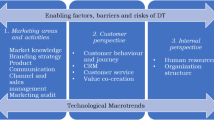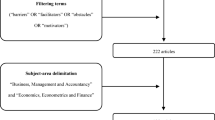Abstract
Green innovation is a guarantee for achieving high-quality economic development. However, the complex cause-and-effect relationship between digital transformation and green innovation has not been systematically studied. Digital transformation not only is about technology but also requires organizational and environmental support. Therefore, this study investigates the relationship between digital transformation and green innovation based on the TOE (technology-organization-environment) framework and configuration theory. A fuzzy set qualitative comparative analysis of data from 1948 listed companies reveals that, first, there is no necessary condition that leads to high green innovation, but digital achievements play a more general role in leading to high green innovation; second, three paths to achieve high green innovation are identified. These different configurations indicate multiple paths and complex cause-and-effect relationships to achieve high green innovation. Third, green innovation is a digital technology-based innovation, but in most cases, it also requires organization and environment support. This study can provide some theoretical and practical guidance for enterprises to enhance their green innovation capabilities through digital transformation and promote the achievement of high-quality company development.

Similar content being viewed by others
Data availability
Data and materials can be accessed by the corresponding author.
References
Abbas J, Sağsan M (2019) Impact of knowledge management practices on green innovation and corporate sustainable development: a structural analysis. J Clean Prod 229:611–620
Abbas S, Gui P, Chen A, Ali N (2022) The effect of renewable energy development, market regulation, and environmental innovation on CO2 emissions in BRICS countries. Environ Sci Pollut Res 29(39):59483–59501. https://doi.org/10.1007/s11356-022-20013-7
Abed SS (2020) Social commerce adoption using TOE framework: an empirical investigation of Saudi Arabian SMEs. Int J Inf Manag 53:102118
Al-Hujran O, Al-Lozi EM, Al-Debei MM, Maqableh M (2018) Challenges of cloud computing adoption from the TOE framework perspective. International Journal of E-Business Research (IJEBR) 14(3):77–94
Ali N, Phoungthong K, Techato K, Ali W, Abbas S, Dhanraj JA, Khan A (2022) FDI, green innovation and environmental quality nexus: new insights from BRICS economies. Sustainability 14(4):2181
Arshad M, Yu CK, Qadir A, Rafique M (2023) The influence of climate change, green innovation, and aspects of green dynamic capabilities as an approach to achieving sustainable development. Environ Sci Pollut Res 30(27):71340–71359. https://doi.org/10.1007/s11356-023-27343-0
Asadi S, Pourhashemi SO, Nilashi M, Abdullah R, Samad S, Yadegaridehkordi E, Aljojo N, Razali NS (2020) Investigating influence of green innovation on sustainability performance: a case on Malaysian hotel industry. J Clean Prod 258:120860
Awa HO, Ojiabo OU, Emecheta BC (2015) Integrating TAM, TPB and TOE frameworks and expanding their characteristic constructs for e-commerce adoption by SMEs. J Sci Technol Policy Manag 6(1):76–94
Bilyalova A, Salimova D and Zelenina T (2020) Digital transformation in education. Paper presented at the Integrated Science in Digital Age: ICIS 2019
Bon AT, Mustafa EM (2013) Impact of total quality management on innovation in service organizations: literature review and new conceptual framework. Procedia Eng 53:516–529
Charles R (2008) Redesigning social inquiry: fuzzy sets and beyond. University of Chicago Press, Chicago
Chittipaka V, Kumar S, Sivarajah U, Bowden JL-H, Baral MM (2022) Blockchain technology for supply chains operating in emerging markets: an empirical examination of technology-organization-environment (TOE) framework. Ann Oper Res 327:465–492
Clift R (2007) Climate change and energy policy: the importance of sustainability arguments. Energy 32(4):262–268
Coccia M (2014) Driving forces of technological change: the relation between population growth and technological innovation: analysis of the optimal interaction across countries. Technol Forecast Soc Chang 82:52–65
Dou Q, Gao X (2022) The double-edged role of the digital economy in firm green innovation: micro-evidence from Chinese manufacturing industry. Environ Sci Pollut Res 29(45):67856–67874
Du Y, Kim PH (2021) One size does not fit all: strategy configurations, complex environments, and new venture performance in emerging economies. J Bus Res 124:272–285
Fenech R, Baguant P, Ivanov D (2019) The changing role of human resource management in an era of digital transformation. Journal of Management Information & Decision Sciences 22(2)
Feng H, Wang F, Song G, Liu L (2022) Digital transformation on enterprise green innovation: effect and transmission mechanism. Int J Environ Res Public Health 19(17):10614
Fiss PC (2011) Building better causal theories: a fuzzy set approach to typologies in organization research. Acad Manag J 54(2):393–420
Fletcher G, Griffiths M (2020) Digital transformation during a lockdown. Int J Inf Manag 55:102185
Furnari S, Crilly D, Misangyi VF, Greckhamer T, Fiss PC, Aguilera R (2020) Capturing causal complexity: heuristics for configurational theorizing. Acad Manage Rev 46(4):778–799
Ganguly KK (2022) Understanding the challenges of the adoption of blockchain technology in the logistics sector: the TOE framework. Tech Anal Strat Manag:1–15
Gangwar H, Date H, Ramaswamy R (2015) Understanding determinants of cloud computing adoption using an integrated TAM-TOE model. J Enterp Inf Manag 28(1):107–130
Greckhamer T (2016) CEO compensation in relation to worker compensation across countries: The configurational impact of country-level institutions. Strateg Manag J 37(4):793–815
Greckhamer T, Furnari S, Fiss PC, Aguilera RV (2018) Studying configurations with qualitative comparative analysis: best practices in strategy and organization research. Strateg Organ 16(4):482–495
Hanelt A, Bohnsack R, Marz D, Antunes Marante C (2021) A systematic review of the literature on digital transformation: insights and implications for strategy and organizational change. J Manag Stud 58(5):1159–1197
Hao X, Chen F, Chen Z (2022) Does green innovation increase enterprise value? Bus Strateg Environ 31(3):1232–1247
Kane GC, Palmer D, Phillips AN, Kiron D, Buckley N (2015) Strategy, not technology, drives digital transformation. MIT Sloan Manag Rev
Karimi Takalo S, Sayyadi Tooranloo H, Shahabaldini parizi, Z (2021) Green innovation: a systematic literature review. J Clean Prod 279:122474. https://doi.org/10.1016/j.jclepro.2020.122474
Ketchen DJ Jr, Kaufmann L, Carter CR (2022) Configurational approaches to theory development in supply chain management: leveraging underexplored opportunities. J Supply Chain Manag 58(3):71–88
Kraus S, Schiavone F, Pluzhnikova A, Invernizzi AC (2021) Digital transformation in healthcare: analyzing the current state-of-research. J Bus Res 123:557–567
Leppänen P, George G, Alexy O (2023) When do novel business models lead to high performance? A configurational approach to value drivers, competitive strategy, and firm environment. Acad Manag J 66(1):164–194
Li HY, Liu Q, Ye HZ (2023) Digital development influencing mechanism on green innovation performance: a perspective of green innovation network. IEEE Access 11:22490–22504
Li J, Chen L, Chen Y, He J (2022) Digital economy, technological innovation, and green economic efficiency—empirical evidence from 277 cities in China. Manag Decis Econ 43(3):616–629
Li T, Han D, Ding Y, Shi Z (2020) How does the development of the internet affect green total factor productivity? Evidence from China. IEEE Access 8:216477–216490
Liu J, Jiang Y, Gan S, He L, Zhang Q (2022) Can digital finance promote corporate green innovation? Environ Sci Pollut Res 29(24):35828–35840
Liu X, Liu F, Ren X (2023) Firms’ digitalization in manufacturing and the structure and direction of green innovation. J Environ Manag 335:117525
Llopis-Albert C, Rubio F, Valero F (2021) Impact of digital transformation on the automotive industry. Technol Forecast Soc Chang 162:120343
Loonam J, Eaves S, Kumar V, Parry G (2018) Towards digital transformation: lessons learned from traditional organizations. Strateg Chang 27(2):101–109
Luo S, Yimamu N, Li Y, Wu H, Irfan M, Hao Y (2022) Digitalization and sustainable development: how could digital economy development improve green innovation in China? Bus Strateg Environ 32(4):1847–1871
Modiba MM, Kekwaletswe RM (2020) Technological, organizational and environmental framework for digital transformation in South African financial service providers. Int J Innov Sci Res Technol 5(5):180–196
Nguyen TH, Le XC, Vu THL (2022) An extended technology-organization-environment (TOE) framework for online retailing utilization in digital transformation: empirical evidence from Vietnam. J Open Innov: Technol Mark Complex 8(4):200. https://doi.org/10.3390/joitmc8040200
Nguyen TT, Pham TAT, Tram HTX (2020) Role of information and communication technologies and innovation in driving carbon emissions and economic growth in selected G-20 countries. J Environ Manag 261:110162
Oliveira T, Martins MF (2010) Understanding e-business adoption across industries in European countries. Ind Manag Data Syst 110(9):1337–1354
Porfírio JA, Carrilho T, Felício JA, Jardim J (2021) Leadership characteristics and digital transformation. J Bus Res 124:610–619
Prajogo DI, Sohal AS (2006) The integration of TQM and technology/R&D management in determining quality and innovation performance. Omega 34(3):296–312
Ragin C (1987) The comparative method: moving beyond qualitative and quantitative methods, pp 454–456
Ramesh N, Delen D (2021) Digital transformation: how to beat the 90% failure rate? IEEE Eng Manag Rev 49(3):22–25
Rennings K (2000) Redefining innovation—eco-innovation research and the contribution from ecological economics. Ecol Econ 32(2):319–332
Schneider CQ, Wagemann C (2012) Set-theoretic methods for the social sciences: a guide to qualitative comparative analysis. Cambridge University Press
Singh A, Hess T (2017) How chief digital officers promote the digital transformation of their companies. MIS Q Exec 16(1)
Sun S, Guo L (2022) Digital transformation, green innovation and the Solow productivity paradox. PLoS One 17(7):e0270928
Sun Y, He M (2023) Does digital transformation promote green innovation? A micro-level perspective on the Solow Paradox. Front Environ Sci 11:247
Tabrizi B, Lam E, Girard K, Irvin V (2019) Digital transformation is not about technology. Harv Bus Rev 13(March):1–6
Tornatzky LG, Fleischer M and Chakrabarti AK (1990a) Processes of technological innovation: Lexington books
Tornatzky LG, Fleischer M and Chakrabarti AK (1990b) The processes of technological innovation
Ullah F, Qayyum S, Thaheem MJ, Al-Turjman F, Sepasgozar SM (2021) Risk management in sustainable smart cities governance: a TOE framework. Technol Forecast Soc Chang 167:120743
Wen J, Ali W, Hussain J, Khan NA, Hussain H, Ali N, Akhtar R (2022) Dynamics between green innovation and environmental quality: new insights into South Asian economies. Econ Polit 39(2):543–565. https://doi.org/10.1007/s40888-021-00248-2
Yang J, Luo B, Zhao C, Zhang H (2022) Artificial intelligence healthcare service resources adoption by medical institutions based on TOE framework. Digital Health 8:20552076221126034
Yi M, Wang S, De Pater IE, Luo J (2022) Who speaks up? Motivational configurations of personality traits to voice behavior. J Pers Psychol 21(2):66
Yin W (2023) Identifying the pathways through digital transformation to achieve supply chain resilience: an fsQCA approach. Environ Sci Pollut Res 30(4):10867–10879
Zhang F, Zhu L (2019) Enhancing corporate sustainable development: Stakeholder pressures, organizational learning, and green innovation. Bus Strateg Environ 28(6):1012–1026
Zhou X, Song M, Cui L (2020) Driving force for China’s economic development under Industry 4.0 and circular economy: technological innovation or structural change? J Clean Prod 271:122680
Zhu X, Ge S, Wang N (2021) Digital transformation: a systematic literature review. Comput Ind Eng 162:107774
Funding
This research was funded by the National Natural Science Foundation Council of China under Project No. 71661029 and Scientific Research Funds in Yunnan Province Department of Education in 2022 under No. 2022Y481.
Author information
Authors and Affiliations
Contributions
Weili Yin: writing—original draft, review, editing, and polishing.
Corresponding author
Ethics declarations
Ethical approval
This article does not contain any studies with human participants or animals performed by any of the authors.
Consent to participate
Not applicable.
Consent for publication
Not applicable.
Competing interests
The authors declare no competing interests.
Additional information
Responsible Editor: Eyup Dogan
Publisher’s note
Springer Nature remains neutral with regard to jurisdictional claims in published maps and institutional affiliations.
Rights and permissions
Springer Nature or its licensor (e.g. a society or other partner) holds exclusive rights to this article under a publishing agreement with the author(s) or other rightsholder(s); author self-archiving of the accepted manuscript version of this article is solely governed by the terms of such publishing agreement and applicable law.
About this article
Cite this article
Yin, W. Does digital transformation matter to green innovation: based on TOE framework and configuration perspective. Environ Sci Pollut Res 30, 100046–100057 (2023). https://doi.org/10.1007/s11356-023-29438-0
Received:
Accepted:
Published:
Issue Date:
DOI: https://doi.org/10.1007/s11356-023-29438-0




